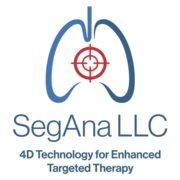SegAna Awarded $750,000 Competitive Grant from the National Science Foundation
Orlando, Fla. – As patients turn to radiation to eliminate cancerous tumors, too often healthy cells and tissues are permanently damaged from radiation aimed at the tumor.
Orlando’s SegAna has developed a cloud-based platform and software algorithm to provide real-time tracking of cancerous tumors and the daily changes of the human anatomy. This program allows oncologists to pinpoint radiation on just the tumor, avoiding healthy tissue.
The National Science Fund has moved the technology to Phase II of its Small Business Innovation Research Grant. This funding initially provides $750,000 in capital for SegAna and could provide an additional $500,000 in matching funds.
“Our Phase I grant was extremely helpful in getting our company to this point and we are thrilled to be able to move forward with our partners at the National Science Foundation,” says Rodney Bosley, CEO, SegAna. “Treating cancer with radiation is a very difficult and damaging process that we hope to make less harmful for the people stricken with this terrible disease.”
Specifically, the grant is to help develop artificial intelligence and machine learning applications in the process. Currently, the company’s RTapp™ addresses the unmet need to see daily changes in anatomy throughout the course of radiation treatment, effectively targeting only the tumor.
Using a “First of Kind” cloud-based platform and proprietary software algorithms, the Phase II award allows any hospital to treat patients with real-time accuracy. RTapp™ will significantly improve a patient’s quality of life, reduce complications, and improve cost of therapy.
With the addition of artificial intelligence and adversarial networks (machine learning), the platform will provide Radiation Oncologists with very accurate recommendations and predictions (predictive analytics) to future changes in tumor location.
Small businesses can receive up to $1.5 million in funding from NSF. Companies must first have received a Phase I award (up to $225,000) to become eligible to apply for a Phase II grant (up to $750,000) to further develop and commercialize the technology. Small businesses with Phase II grants are eligible to receive up to $500,000 in additional matching funds with qualifying third-party investment or sales.
Small businesses with innovative science and technology solutions, and commercial potential across almost all areas of technology are encouraged to apply. All proposals submitted to the NSF SBIR/STTR program undergo a rigorous merit-based review process. NSF’s deadlines for Phase I small business proposals occur twice annually, in June and December.
“The National Science Foundation supports startups and small businesses with the most innovative, cutting-edge ideas that have the potential to become great commercial successes and make huge societal impacts,” said Graciela Narcho, Acting Director of the Division of Industrial Innovation and Partnerships at NSF. “We hope that seed funding will spark solutions to some of the most important challenges of our time across all areas of science and technology.”
# # #
For more information media should contact –
SegAna: Tres Riley 817-455-0575 or triley@seganatech.com
UCF Business Incubation Program: Carol Ann Dykes Logue, 407-635-9882, carolann.dykeslogue@ucf.edu or Alan Byrd, Alan Byrd & Associates, 407-415-8470, Alan@ByrdConnections.com
About SegAna: SegAna LLC, Orlando (www.seganatech.com) is a medical device company that has developed a cloud-based software platform utilizing Artificial Intelligence and a proprietary algorithm that measures changes in patient specific tissue elasticity for enhancing radiation treatment of cancer. The company’s patent pending state of the art technology enhances the treatment of cancer by providing the Radiation Oncologist, in any setting or location, with the ability to accurately define the margin of the tumor on the day of treatment and predict an abnormal treatment up to 3 days in the future. The Radiation Oncologist utilizes this information to develop a new patient treatment plan which will ultimately reduce radiation damage to the tissue surrounding the tumor and improve a patient’s outcome. For more information, please visit SegAnaTech.com
About the UCF Business Incubation Program: The University of Central Florida Business Incubation Program is a community resource that provides early-stage companies with the tools, training and infrastructure to become financially stable, high growth/impact enterprises. Since 1999, this award-winning program has helped over 390 local startup companies reach their potential faster by providing vital business development resources.
With seven facilities throughout the region, the UCF Business Incubation Program is an economic development partnership between the University of Central Florida, the Corridor, Orange, Osceola, Seminole and Volusia counties, and the cities of Apopka, Kissimmee, Orlando and Winter Springs. For the 2016/17 and 2017 /18 fiscal years, the activities of these participating firms have helped sustain more than 6,275 local jobs and have had a cumulative impact of more than $888 million on regional GDP and more than $1.59 billion on regional sales. During the same period, the program has returned $12.03 for every $1 invested in the program. For more information, visit Incubator.UCF.edu.
About the National Science Foundation’s Small Business Programs: America’s Seed Fund powered by NSF awards $200 million annually to startups and small businesses, transforming scientific discovery into products and services with commercial and societal impact. Startups working across almost all areas of science and technology can receive up to $1.5 million in non-dilutive funds to support research and development (R&D), helping de-risk technology for commercial success. America’s Seed Fund is congressionally mandated through the Small Business Innovation Research (SBIR) program. The NSF is an independent federal agency with a budget of about $8.1 billion that supports fundamental research and education across all fields of science and engineering. For more information, visit seedfund.nsf.gov






